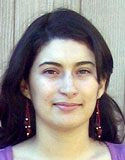Andrea Arias
 |
| Andrea Arias |
Andrea Arias works with Center for Participatory Change and was instrumental in the founding of Coalicion de Organizaciones Latino Americanas (COLA).
COLA is a coalition of 25 Latino-led grassroots organizations from across Western North Carolina. The coalition works to strengthen each member organization and to provide a voice for Latinos.
Arias was born in Colombia, South America and received her bachelor’s degree there. Originally she planned to be an ESL teacher in her country, but it was extremely hard to find work. She came to the U.S. in 2001 and worked a variety of jobs in the service industry before beginning to volunteer teaching Spanish at a community college. She also began volunteering with the Latino-American community as a founding member of COLA.
In
2003, Arias was hired by the Center for Participatory Change to do
outreach to the Latino community. “I think I have found my true
vocation in doing social justice and community building work with
immigrant communities,” she says. “I would like to do similar work in
Colombia some day.” Arias plans to attend graduate school and study
International Community Economic Development, while continuing her role
at CPC.
COLA is focused
on the organization of grassroots groups; they have done workshops on
immigrant rights, fundraising, workers’ rights, civic participation,
and legal issues. COLA holds an encuentro (gathering) of Latin American
groups three times a year. “We go alongside groups, supporting them and
providing technical assistance, helping resolve conflicts. We are very
excited with what COLA can do now as a regional network.” Arias also
helped found CCHA (Centro Comunitario Hispano Americano) in Brevard.
She travels a lot and has relationships with all the Latino centers.
Arias also
played a key role in last May’s big march for immigrant rights. She
helped connect with organizers all over the state. After attending a
planning group for another march, she brought back know-how on training
legal observers and other volunteers, safety factors, and other
logistics. Arias facilitated meetings of volunteers prior to the march.
“I like to help
people work together and make changes. My big vision is to have a place
where people can respect each other and uphold each other’s dignity; be
open-minded despite tensions and problems, and be willing to work
things out. For immigrants, I would like to see a dignified life. I
want people to be able to choose if they want to come to this country
or not. My dream is that nobody has to leave their country because of
war, violence, or economics. I call my family twice a week.”
“I want families
to be able to grow together, for children to feel proud of their
culture and have places to celebrate that; to be not only accepted, but
respected, without having to give up who they are. Many of the problems
of immigrants are due to the fact that we had to leave. There is a lot
of alcoholism; people feel lonely because their families are back in
their countries. Family life is broken up: even if the parents and
children are here, the parents are working 2 or 3 jobs, don’t have time
for their kids, and they don’t have the grandparents or aunts to care
for the kids.”
In conclusion:
“We can make changes; we can change our living conditions. Our
communities have a lot of wealth in our talents and passions-a lot to
offer, which isn’t just about money. We look so much for what’s missing
and what’s the problem. Let’s focus on these assets and celebrate
them!”







